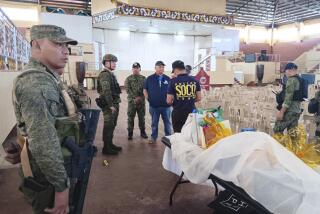Marketplace Blast Kills 9 in Philippines
- Share via
ZAMBOANGA CITY, Philippines — At least nine people were killed and dozens injured when a bomb ripped through a crowded market Saturday in the southern Philippine town of Koronadal, authorities said.
The bomb, made from an 81-millimeter mortar shell, exploded in a busy shopping street, killing several victims instantly. Authorities said two suspected bombers, including one seen setting down a package containing the device, might have been among those killed.
“We have witnesses saying the two men, whose heads were decapitated by the blast, could be the bombers,” said South Cotabato provincial Gov. Daisy Fuentes.
“We are not saying they were suicide bombers, but the bomb may have been detonated accidentally.”
The Philippine military blamed the attack on the rebel Moro Islamic Liberation Front, which is waging an increasingly bloody separatist war against the central government in Manila. A spokesman for the group denied the charge.
Shortly before the bombing, a man believed to be a leader of the terrorist Abu Sayyaf gang telephoned and threatened to bomb the town if he was not given thousands of dollars, said Koronadal Mayor Fernando Miguel.
The man, who claimed to be Abu Sayyaf leader Abu Solaiman, had been calling since last year demanding money, Miguel told radio network dzRH. Abu Sayyaf, made up of Islamic bandits, is best known for kidnapping hostages for ransom, including several Americans.
“Abu Solaiman contacted me prior to the blast and was asking for 1 million pesos, but we refused to pay him, because it was illegal,” the mayor said. The amount is equivalent to about $19,200.
Solaiman is one of five Abu Sayyaf leaders wanted by the United States for the kidnapping and killing of two Americans, tourist Guillermo Sobero of Corona, Calif., and missionary Martin Burnham of Wichita, Kan. The mayor said Solaiman warned of “more bombings in the days to come.” Shortly after the blast, soldiers found a second bomb concealed in a cooking gas canister and planted near the Koronadal fire department.
The blast in Koronadal, the capital of South Cotabato province, was at least the third deadly bombing in the southern Philippines in the last 2 1/2 months. In Davao City, blasts at the airport and a ferry terminal killed 37 people, including an American missionary.
The impoverished Mindanao region of the southern Philippines has long been the center of conflict between the Roman Catholic-dominated central government and Muslim groups seeking independence. The fighting has escalated in recent months as the Moro Islamic Liberation Front, with an estimated 12,000 armed men, has battled government forces.
Recent attacks on civilian targets have sparked fears that a religious war could break out. Last month, Christian villagers angry over raids by Islamic rebels in the town of Maigo raided a nearby Muslim settlement, burning houses and killing a 6-year-old girl, the military said.
In the tumultuous region where rebel groups flourish and there is fighting on several fronts, authorities have sometimes offered conflicting allegations about who is behind acts of violence.
Some officials have blamed recent bombings on Jemaah Islamiah, a regional terrorist group allegedly responsible for dozens of bombings in Manila and Indonesia, including an Oct. 12 bombing on the island of Bali that killed 202 people.
Jemaah Islamiah and Abu Sayyaf are alleged to have ties to the Al Qaeda network of Osama bin Laden and to the Moro Islamic Liberation Front, but there is no indication that they have joined forces.
In one recent case, however, authorities said members of the Abu Sayyaf joined the Moro Islamic Liberation Front in attacking a predominantly Christian town.
Authorities say Moro Islamic Liberation Front rebels backed by Abu Sayyaf fighters swooped down on the remote southern town of Siocon last weekend and killed Christian villagers before setting the market on fire and taking 100 people hostage. The hostages were later freed.
After the Siocon attack, Philippine President Gloria Macapagal Arroyo canceled preliminary peace talks with the Moro Islamic Liberation Front that were scheduled for this month in Malaysia. She also posted a $1-million reward for the capture or killing of Moro Islamic Front chieftain Salamat Hashim and other senior rebel leaders.
*
Times staff writer Paddock reported from Jakarta, Indonesia, and special correspondent Jacinto from Zamboanga City.
More to Read
Sign up for Essential California
The most important California stories and recommendations in your inbox every morning.
You may occasionally receive promotional content from the Los Angeles Times.












